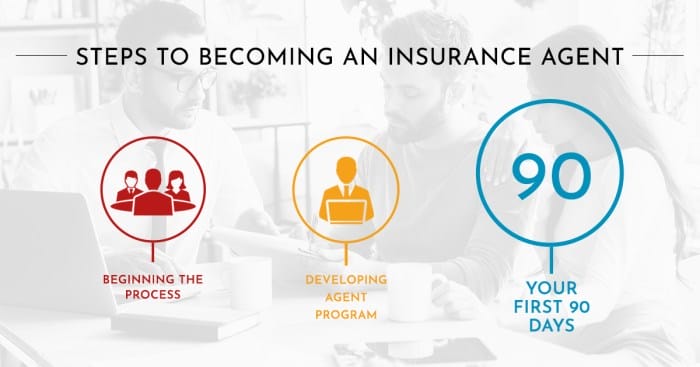In the realm of financial security, life insurance agents play a pivotal role in guiding individuals and families toward a future free from financial uncertainties. To succeed in this competitive industry, agents must possess a comprehensive understanding of market dynamics, cultivate strong relationships, and master effective sales techniques.
This guide delves into proven strategies that empower life insurance agents to build a thriving business and establish themselves as trusted advisors in their communities.
The foundation of a successful life insurance agent lies in a deep understanding of the market landscape. Through meticulous research, agents can identify target audiences, comprehend their unique needs, and address their pain points. Building strong relationships is paramount, as trust and credibility are essential for converting prospects into loyal clients.
Effective communication, empathy, and active listening foster rapport and lay the groundwork for long-term partnerships.
Market Research

Conducting thorough market research is crucial for life insurance agents to understand their target audience’s needs, preferences, and pain points. By gaining insights into the market, agents can tailor their strategies, products, and services to effectively address the unique requirements of their clients.
Market research involves gathering and analyzing data to identify potential clients and segment the market into distinct groups based on factors such as age, income, lifestyle, and financial goals. This segmentation allows agents to customize their approach and deliver personalized solutions that resonate with each segment’s specific needs and concerns.
Identifying Potential Clients
Identifying potential clients is a key step in market research. Agents can utilize various methods to find individuals who are likely to be interested in life insurance products and services.
- Referrals: Existing clients are a valuable source of referrals. By encouraging satisfied clients to refer their friends, family, and associates, agents can tap into a network of potential customers who are already familiar with and trust the agent’s services.
- Networking: Attending industry events, joining professional organizations, and participating in community activities are effective ways for agents to expand their network and connect with potential clients. Building relationships with individuals in various fields can lead to referrals and opportunities to discuss life insurance solutions.
- Online Marketing: Utilizing digital platforms, such as social media, search engine optimization (), and pay-per-click (PPC) advertising, can help agents reach a wider audience and attract potential clients who are actively seeking information about life insurance.
Building Relationships

In the life insurance industry, establishing strong relationships with clients and prospects is crucial for long-term success. Building rapport, trust, and credibility with potential customers is the foundation of a thriving business.
To foster meaningful relationships, life insurance agents should prioritize active listening, empathy, and understanding. By taking the time to learn about their clients’ needs, concerns, and aspirations, agents can provide personalized solutions that align with their unique circumstances.
Communication Strategies
Effective communication is a cornerstone of building strong relationships. Here are some strategies for fostering open and productive communication with clients and prospects:
- Transparency and Honesty: Be transparent and honest in all interactions, building trust and credibility.
- Active Listening: Practice active listening by paying full attention, showing empathy, and asking thoughtful questions.
- Tailored Communication: Tailor your communication style to the individual client, considering their preferences, values, and communication style.
- Regular Check-Ins: Schedule regular check-ins to maintain open communication and address any evolving needs or concerns.
- Feedback Mechanisms: Encourage clients to provide feedback, demonstrating your commitment to continuous improvement.
Networking and Referrals

Networking and generating referrals are crucial for success in the insurance industry. Building a robust network of professionals and satisfied clients can significantly boost your business growth.
Expanding Professional Networks
- Actively participate in industry events, seminars, and conferences to connect with potential clients and industry peers.
- Join professional organizations related to insurance, such as the National Association of Insurance and Financial Advisors (NAIFA), to expand your network.
- Engage with colleagues on social media platforms like LinkedIn, sharing valuable content and insights to establish yourself as a thought leader.
Leveraging Social Media Platforms
- Utilize social media platforms to connect with potential clients and build relationships. Share valuable content, engage in conversations, and respond promptly to inquiries.
- Use social media to showcase your expertise, share success stories, and highlight client testimonials to build credibility and trust.
Requesting and Receiving Referrals
- Provide exceptional service to your clients, consistently exceeding their expectations. Satisfied clients are more likely to refer you to their friends and family.
- Ask satisfied clients for referrals politely and professionally. Offer incentives or referral programs to encourage them to refer new customers.
- Follow up with clients regularly to maintain relationships and remind them of your services.
Sales Techniques

Effective sales techniques are crucial for life insurance agents to succeed in this competitive industry. These techniques involve presenting policy options, handling objections, and closing deals successfully. Let’s explore some effective sales techniques tailored specifically for life insurance products.
Presenting Policy Options
Presenting policy options to clients requires a comprehensive understanding of their needs, financial situation, and risk tolerance. Agents should adopt a consultative approach, actively listening to clients’ concerns and tailoring recommendations accordingly. It’s important to explain policy features and benefits in a clear and concise manner, using relatable examples and avoiding jargon.
Visual aids, such as brochures or infographics, can help clients visualize the value of the policy and its potential impact on their lives.
Handling Objections
Handling objections is an integral part of the sales process. Agents should anticipate common objections and prepare effective responses. Objections can range from concerns about affordability to doubts about the necessity of life insurance. It’s essential to remain calm and respectful, listening attentively to the client’s concerns.
Agents should provide clear and concise explanations, addressing each objection individually and offering alternative solutions when appropriate.
Closing Deals Successfully
Closing deals successfully requires a combination of persistence, persuasion, and professionalism. Agents should create a sense of urgency by emphasizing the importance of securing coverage promptly. Offering incentives or limited-time promotions can also help motivate clients to make a decision.
Additionally, agents should instill confidence by highlighting their expertise and track record of success. A strong closing statement, summarizing the benefits of the policy and addressing any lingering concerns, can be instrumental in securing the sale.
Product Knowledge

In-depth knowledge of life insurance products and their intricacies is the foundation of a successful agent’s expertise. This mastery allows for tailored recommendations that align with clients’ unique needs and circumstances. To stay ahead, agents must continuously update their knowledge of industry trends, policy changes, and new product offerings.
Understanding Products
Profound understanding of life insurance products encompasses their benefits, limitations, and suitability for different client profiles. This includes term life, whole life, universal life, variable life, and variable universal life insurance. Each product has distinct characteristics, such as death benefit, cash value accumulation, and premium payment options.
Staying Updated
Staying abreast of industry trends and policy changes is crucial for effective product knowledge. This involves regularly reviewing industry publications, attending seminars and workshops, and maintaining contact with insurance carriers. Additionally, agents should be aware of regulatory updates that impact life insurance products and practices.
Tailoring Recommendations
Tailoring product recommendations to individual client needs is a hallmark of successful agents. This requires a comprehensive understanding of the client’s financial situation, risk tolerance, and long-term goals. By matching the appropriate product to the client’s specific requirements, agents can deliver customized solutions that provide optimal protection and financial security.
Financial Planning and Needs Analysis

Financial planning and needs analysis are vital components of the life insurance sales process, guiding agents in providing personalized recommendations and solutions to their clients. By conducting comprehensive assessments, agents gain insights into clients’ financial goals, risk tolerance, and insurance requirements, enabling them to tailor insurance coverage that aligns with their unique circumstances.
Understanding Financial Goals and Objectives
The initial step in financial planning is understanding the client’s financial goals and objectives. This includes their short-term and long-term aspirations, such as saving for retirement, funding a child’s education, or purchasing a home. By understanding these goals, agents can recommend insurance products that help clients achieve their financial milestones.
Assessing Risk Tolerance
Risk tolerance plays a significant role in determining the type and amount of life insurance coverage a client needs. Agents should assess the client’s risk appetite, considering their ability to withstand financial losses and their comfort level with uncertainty. This assessment helps determine the appropriate balance between coverage and affordability.
Identifying Insurance Requirements
Based on the financial assessment, agents can identify the client’s insurance requirements. This includes determining the appropriate coverage amounts for life insurance, disability insurance, and long-term care insurance. Agents should also consider the client’s existing insurance policies and any gaps in coverage that need to be addressed.
Financial Planning Tools and Techniques
Various financial planning tools and techniques are used in the life insurance industry to help agents conduct comprehensive needs analyses. These tools include:
- Cash flow analysis: This tool helps determine a client’s income, expenses, and savings, providing insights into their financial situation.
- Net worth analysis: This tool calculates a client’s net worth by subtracting their liabilities from their assets, providing a snapshot of their financial health.
- Retirement planning tools: These tools help clients estimate their retirement income needs and determine the appropriate savings rate to achieve their retirement goals.
- Insurance needs calculators: These calculators help agents determine the appropriate amount of life insurance coverage based on the client’s financial situation and goals.
Continuing Education and Professional Development
Intro ParagraphIn the ever-evolving world of life insurance, continuous learning and professional development are vital for agents to maintain their expertise and adapt to changing market dynamics. This section delves into the significance of ongoing education, provides practical tips for staying up-to-date, and highlights the benefits of industry conferences, workshops, and training programs.
Staying Current with Industry Regulations
Explanatory ParagraphLife insurance agents have a responsibility to stay informed about the latest industry regulations and compliance requirements. This ensures they operate within legal and ethical boundaries, protecting both their clients and their business.List
- Regularly review industry publications, whitepapers, and regulatory updates.
- Attend webinars and seminars focused on regulatory compliance.
- Participate in continuing education programs that cover regulatory changes.
Product Knowledge and Sales Techniques
Explanatory ParagraphStaying up-to-date on product updates and sales techniques is essential for agents to provide tailored solutions and enhance their sales effectiveness.List
- Familiarize yourself with new product offerings and their features.
- Attend product training sessions conducted by insurance carriers.
- Explore innovative sales techniques and strategies through industry resources.
Networking and Learning Opportunities
Explanatory ParagraphIndustry conferences, workshops, and training programs offer valuable opportunities for agents to network with peers, learn from experts, and enhance their skills.List
- Attend industry conferences and seminars to stay informed about trends.
- Participate in workshops and training programs to hone sales skills.
- Engage in discussions with industry experts to gain insights.
Time Management and Organization

In the fast-paced world of life insurance sales, effective time management and organization are crucial for success. Mastering these skills allows agents to prioritize tasks, set clear goals, and manage their busy schedules, ensuring they make the most of every working hour.
Successful life insurance agents employ various strategies to stay organized and productive. These include:
Setting Clear Goals
Establishing clear and measurable goals is essential for focused and productive work. Agents should set both short-term and long-term goals, ensuring they are specific, measurable, achievable, relevant, and time-bound (SMART).
Prioritizing Tasks
With a clear understanding of their goals, agents can prioritize their tasks accordingly. This involves identifying high-priority activities and allocating time to them first. Effective prioritization helps agents focus on tasks that contribute directly to their goals.
Creating a Schedule
Once tasks are prioritized, agents should create a schedule that Artikels when and how they will complete each task. This schedule should be flexible enough to accommodate unexpected events but structured enough to provide a sense of direction and accountability.
Using Productivity Tools
Numerous productivity tools and techniques can help life insurance agents stay organized and efficient. These tools include digital calendars, task management apps, and time tracking software. Agents can choose the tools that best suit their individual needs and preferences.
Taking Breaks
While staying focused and organized is important, taking regular breaks is essential for maintaining productivity and preventing burnout. Short breaks throughout the day can help agents refresh their minds, recharge their energy, and return to work with renewed focus.
Business Planning and Goal Setting

For life insurance agents, a well-defined business plan and achievable goals are the foundation for success. A comprehensive plan provides a roadmap, guiding daily activities and ensuring alignment with long-term objectives.
The initial step involves conducting a SWOT analysis, evaluating strengths, weaknesses, opportunities, and threats. This assessment enables agents to identify their unique selling proposition, understand market dynamics, and develop strategies to capitalize on opportunities while mitigating risks.
Target Market Identification
Identifying the target market is crucial for effective marketing efforts. Agents should consider factors such as age, income, lifestyle, and insurance needs when defining their target audience. Understanding the specific needs and concerns of the target market allows agents to tailor their messaging and strategies accordingly, increasing the likelihood of successful sales conversions.
Marketing Strategy Development
With a clear understanding of the target market, agents can develop a comprehensive marketing strategy. This strategy should encompass a mix of traditional and digital marketing channels, such as print advertising, social media marketing, search engine optimization (), and email marketing.
A well-executed marketing strategy helps agents reach their target audience, generate leads, and build a strong client base.
Examples of Successful Business Plans and Goal-Setting Strategies
Numerous life insurance agents have achieved remarkable success by implementing effective business plans and goal-setting strategies. One notable example is Sarah Johnson, a life insurance agent who set a goal to increase her annual sales by 20% within a year.
Through meticulous planning, consistent effort, and effective marketing, she surpassed her goal, achieving a 25% increase in sales within the targeted timeframe.
Another example is John Smith, a life insurance agent who identified a gap in the market for affordable life insurance policies for young professionals. He developed a targeted marketing campaign specifically for this segment, resulting in a significant increase in sales and establishing himself as a leading provider of life insurance solutions for young professionals in his region.
Last Recap
In the ever-evolving world of life insurance, continuous learning and professional development are imperative for agents to stay ahead of the curve. Attending industry conferences, workshops, and training programs ensures that agents remain abreast of regulatory changes, product updates, and emerging sales techniques.
By embracing these opportunities, agents can refine their skills, enhance their knowledge, and adapt to the dynamic needs of their clients.
Common Queries
Q: How can life insurance agents effectively manage their time and prioritize tasks?
A: Prioritization, goal-setting, and effective time management are crucial for life insurance agents. Utilizing productivity tools and techniques, agents can streamline their workflow, allocate time efficiently, and ensure that high-priority tasks receive the attention they deserve.
Q: Why is it important for life insurance agents to conduct comprehensive financial assessments?
A: Financial planning and needs analysis empower life insurance agents to tailor product recommendations to individual client requirements. By understanding clients’ goals, risk tolerance, and insurance needs, agents can provide personalized solutions that align with their unique financial situations.
Q: How can life insurance agents leverage social media platforms to expand their professional networks?
A: Social media platforms offer a powerful tool for life insurance agents to connect with potential clients, industry peers, and referral sources. Engaging with relevant content, joining professional groups, and actively participating in online discussions can help agents expand their networks and generate valuable leads.



